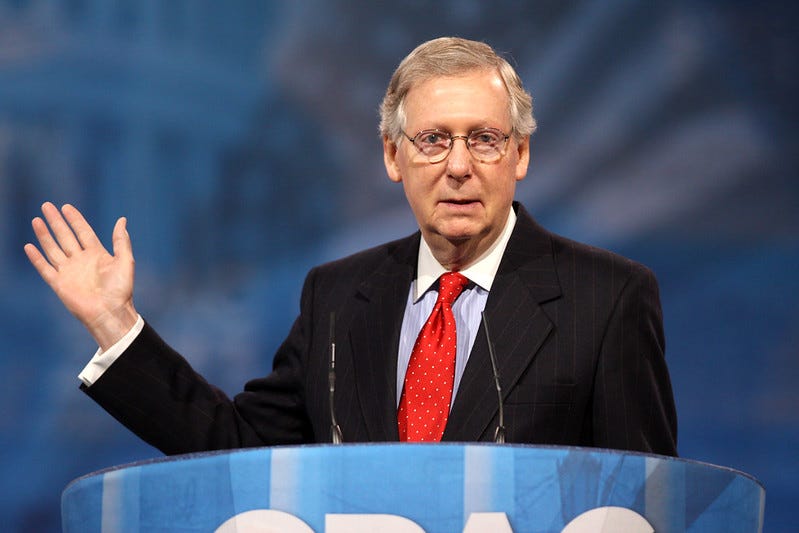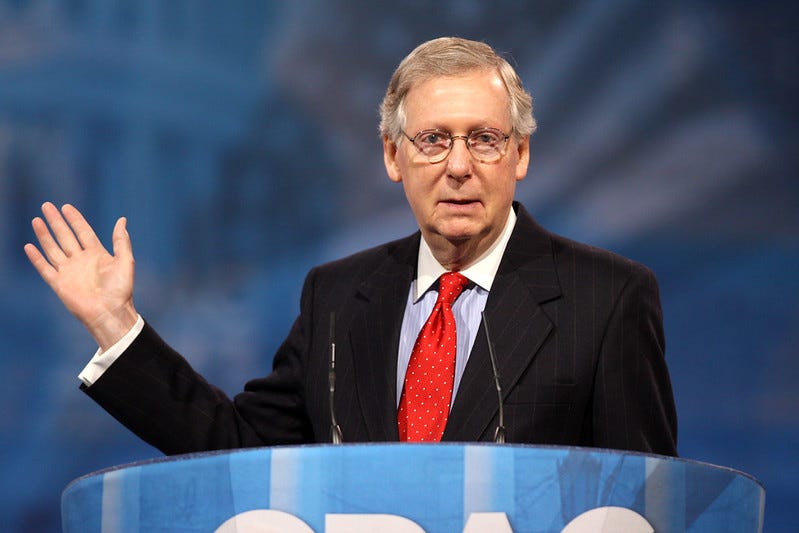Wake Up To Politics - December 3, 2021
Wake Up To Politics: Shutdown threat averted
by Gabe Fleisher
Good morning! It’s Friday, December 3, 2021. Election Day 2022 is 340 days away. Election Day 2024 is 1,068 days away.
Congress averts shutdown, makes little headway on rest of to-do list
On Tuesday of this week, I wrote that Congress has a long to-do list for December, packed with must-pass bills and pressing deadlines. Today, I want to check back in with the four priorities I named and see what progress (if any) lawmakers have made on them:
Government funding (deadline: December 3). This was the item with the most pressing deadline, and it’s the only one Congress has made significant headway on. Both chambers passed a continuing resolution on Thursday that will extend government funding at its current levels through February 18, averting a shutdown that would have began at midnight tonight if no stopgap fix had been approved.
The funding measure passed 221-212 in the House, with all Democrats and one Republican — Rep. Adam Kinzinger (R-IL) — voting in support, and 69-28 in the Senate, with all Democrats and 19 Republicans voting in support.
There had been a brief possibility of a shutdown, as a group of GOP senators threatened to block the funding bill if a provision wasn’t included barring enforcement of President Biden’s vaccine mandate for businesses with 100 or more employees. The senators eventually relented, accepting a vote on an amendment that would have blocked the vaccine mandate. The amendment failed 48-50, along party lines.

Debt ceiling (deadline: December 15). Treasury Secretary Janet Yellen is warning lawmakers there are less than two weeks until her department hits its borrowing limit — which would send the government into default and possibly trigger a global financial crisis. But there seems to be little urgency in Congress to raise the debt ceiling and avoid that unprecedented scenario.
Senate Majority Leader Chuck Schumer (D-NY) and Minority Leader Mitch McConnell (R-KY) have continued closed-door discussions on the debt limit this week, although neither have disclosed any details on their talks. “Let me assure everyone the government will not default, as it never has,” McConnell said Tuesday, without revealing how one would be avoided.
There have been some discussions about including a debt ceiling hike in the National Defense Authorization Act (which I’ll discuss below), although it’s unclear how feasible that would be. House Minority Leader Kevin McCarthy (R-CA) poured cold water on that idea Thursday; like McConnell, he has urged Democrats to use the one-party reconciliation process to raise the debt ceiling, which they have refused to do.

National Defense Authorization Act (deadline: December 31). This is the annual bill setting policy and funding levels for the Department of Defense that Congress has passed every year since 1961. But as the end of the year marches closer, another week has passed without any progress being made on the package.
The source of the delay? Sen. Marco Rubio (R-FL) has been blocking the bill from advancing, insisting on a vote for an amendment that would ban imports from the Xinjiang region of China, where about 1 million Uyghur Muslims are estimated to be in forced labor camps run by the Chinese government.
Democrats have resisted including Rubio’s amendment in the NDAA because they say it violates a constitutional requirement for revenue-related legislation to originate in the House. Rubio, however, has pointed out that there are ways around that requirement that are frequently used by Congress; he has accused Democrats of bowing to pressure from the Biden administration to block the amendment.

Build Back Better Act (self-imposed deadline: December 31). Democrats had hoped to pass their sweeping $1.85 trillion economic spending package by the end of the year, but amid the crop of other priorities and a wave of resistance from moderate senators, that’s seeming less and less likely.
Sen. Kyrsten Sinema (D-AZ) refused to commit to voting for the package in a CNN interview on Thursday. The network also reported that her fellow moderate Sen. Joe Manchin (D-WV) has privately told colleagues that he still has a number of concerns about the legislation and is skeptical it will be able to pass by the end of the year.
One Democratic senator anonymously told CNN that there was a “20-25%” chance the package — which passed the House last month — would also be approved in the Senate by the end of 2021.
What else you should know
→ There have now been at least nine cases of the Omicron variant identified in the United States, in five states: California, Colorado, Hawaii, Minnesota, and New York.
→ The FDA is preparing for a rapid review of vaccines and drugs targeted for Omicron, the Wall Street Journal is reporting.
→ The Biden administration reached a deal with the Mexican government to resume enforcement of the Trump-era “Remain in Mexico” policy, which requires asylum seekers to wait in Mexico while their claims are processed. Biden had halted the program, but a federal judge ordered him to restart it.

Daybook
All times Eastern.
→ President Joe Biden will receive his daily intelligence briefing at 9:30 a.m. Then, at 10:15 a.m., he will deliver remarks on the November jobs report. At 12:15 p.m., he will have lunch with Vice President Kamala Harris. Finally, at 5:3o p.m., he will leave for Camp David, where he will spend the weekend.
→ First Lady Jill Biden will travel to Philadelphia, Pennsylvania, and Tahlequah, Oklahoma, today. In Philadelphia, she will visit a pediatric COVID-19 vaccination clinic at 10:45 a.m. to continue the administration’s efforts to urge parents to vaccinate their children 5 years of age and older. Gov. Tom Wolf (D-PA) and Reps. Dwight Evans (D-PA), Mary Gay Scanlon (D-PA), and Brandon Boyle (D-PA) will also be on hand, along with former Philadelphia 76ers player World B.
In Tahlequah, she will visit the Cherokee Immersion School with Interior Secretary Deb Haaland for an event highlighting the importance of Native language preservation.
→ White House Press Secretary Jen Psaki will hold her daily press briefing at 1:30 p.m.
→ U.S. public health officials will hold a press briefing at 11 a.m. to provide an update on the federal COVID-19 response. Participants will include Dr. Anthony Fauci, the president’s chief medical adviser; Dr. Vivek Murthy, the U.S. surgeon general; Dr. Rochelle Walensky, the CDC director; and Jeff Zients, the White House COVID-19 response coordinator.
→ The Senate will not meet today.
→ The House will convene at 9 a.m. for a brief pro forma session. No votes will be held or legislative business conducted.
→ The Supreme Court justices will meet for their weekly conference.



